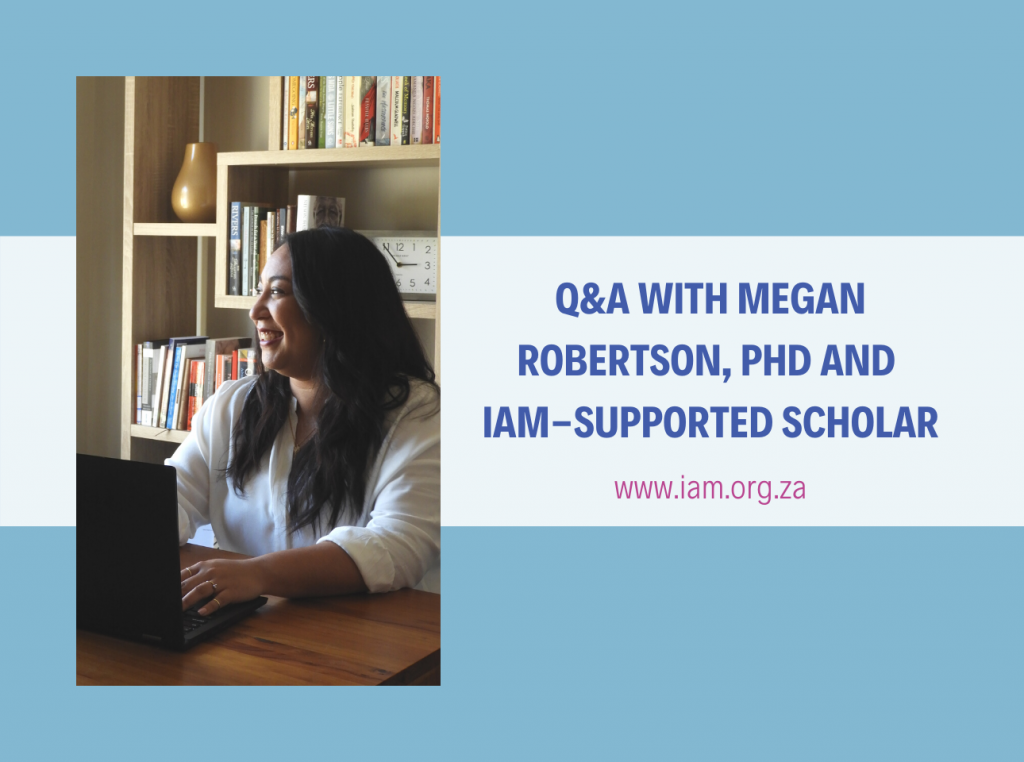Whenever possible, IAM supports scholars working with our partner institutions who are undertaking research to further the body of knowledge around the intersection of LGBTIQ+ identity and religion. IAM provided support and connections to help further Megan Robertson’s PhD field research at the University of the Western Cape, the first PhD thesis devoted to the study of queer clergy in South Africa. Megan, who graduated in 2020, spoke with IAM about the nature and importance of her research, what motivated her to do this research, what it meant to undertake the study as an LGBTIQ+ ally, and some of her key research findings. You can read her thesis in its entirety here.
IAM: What is your research about and what is its importance to the study of religion and sexuality?
Megan Robertson: In my research I explore the lived experiences of five queer clergy and one former clergy member in the Methodist Church of Southern Africa (MCSA), in order to understand the complex relationship between institutional power and their ordinary lived realities.
In South Africa, anti-queer attitudes are propped up by religious moral claims and by strong assertions that queer sexualities are un-African and a secular Western import. My doctoral dissertation contributes to the growing body of literature which challenges these claims. At the same time it seeks to interrupt scholarly trends in the field of religion and sexuality which either characterises institutional religion as singularly oppressive or homogenises queer Christians as inherently subversive.
IAM: How did you produce your data for this research?
MR: Uniquely for studies on Christianity and sexuality in Africa, this project did not rely on confessional, theological methods. Rather, I foregrounded a sociological approach to the study of religion and developed a queer ethnographic methodology to explore the experiences of my participants. This meant that I spent approximately a week with each of the participants, interviewing and observing their work and home lives.
IAM: What motivated you to do this research?
MR: Being raised Methodist shaped a considerable part of my identity and worldview. The congregation which I grew up in not only shaped my belief systems but perhaps more significantly it was a place to which I felt I belonged. As a teenager and young adult I became more involved in the broader provincial and national structures of the MCSA, and I often experienced these spaces as patriarchal, racially segregated and hierarchical. One of the most striking cases was when Rev Ecclesia De Lange was excommunicated from the Church for declaring her intention to marry her same-sex partner. Therefore, for me, the Church and religion became both a place of significant belonging as well as a space for a great deal of injustice. These experiences led me to question how others negotiate these competing experiences. I was particularly interested in the experiences of queer clergy who are both deeply entrenched in the institution and simultaneously excluded by it.
IAM: What did it mean for you to do this research as an ally?
MR: I was extremely mindful of the identity politics at play in this research. While I do not identify as LGBTQI+ myself, I am allied to the cause. While some might argue that only queer people should study other queer people, or similarly, that only women should study women, or black people other black people – I would argue that the benefits of queer thinking opens up more nuanced and fruitful engagements with research. Queer theory challenges binary ways of thinking about the world including the idea of insider-outsider research. The idea that someone is either part of the group they study or an outsider to the group assumes that the researcher and participants have only one fixed identity. My study nuances this thinking as I pay attention to the various intersecting identities of race, class, sexuality, and gender which influence my participants experiences with the Church as well as my interactions with them in the research. This is not to say I try to wish away the power and privilege that is implicated in my identity as a cis-gender, heterosexual women doing queer research. Rather, I tried to openly and honestly account for this in my research by adopting principles of transparency, kinship and activism.
IAM: What were some of your research findings?
MR: I identify three key findings in my dissertation, all of which are aimed at adding nuance to the ways in which we understand and theorise queer Christian subjects in Africa and South Africa.
- While institutionalised religion is often placed in opposition to queer sexuality, my participants’ experiences suggest that institutionalised religion can still function as a ‘home’ for queer Christians. This does not mean participants were not sometimes disappointed with their ‘home’ or that they did not want to change aspects of it. In fact, participants’ narratives indicate that the safety they experienced at home was marginal and required not only negotiation of their own identities but of the very idea of what home and safety looks like. The ‘home’ which they found in the MCSA was not one which was perfectly safe and equipped for their needs, rather it has rusty pipes, cracks in the walls and the roof threatens to leak when the rain comes. However, it is still ‘home’ and therefore the nominal and limited safety and belonging it does provide is something they continue to protect.
- One of the major ways in which the cracks of the walls of the MCSA are shown are through the embodied experiences of clergy women of colour. The women of colour in my study relayed particularly harrowing stories about the gender and sexuality policing and sexual violence which they experience both inside and outside the Church, subjected by both clergy and lay persons. The protection, privilege and power which is often afforded to the role of ‘clergy’, regardless of their sexuality, is often unavailable to women.
- I found that despite the MCSA’s unwillingness to allow same-sex marriage, participants still described themselves as married, while others were dating or single, and still others described themselves as promiscuous. It is therefore not only those doctrines or church policies which speak directly to same-sex marriage that influence the domestic and erotic lives of queer clergy in my study. Rather, the broader heteronormative and patriarchal culture of the Church, which is infused into its structures, procedures and traditions greatly influence what is permitted by the Church. For example, in some spaces in the Church, it is broadly accepted that sexual promiscuity amongst clergy is the norm – regardless of sexual orientation or identity. However, this is only broadly acceptable because it takes place in ways which preserve the power of men and clergy positions.
IAM: How did IAM’s support benefit this research?
MR: At the beginning of my project IAM connected me to clergy who became my initial participants in the study and who later connected me to other queer clergy members. Without IAM’s networks this would not have been possible. In addition, IAM’s support enabled me to attend conferences such as the European Conference for African Studies and the conference for the Association for the Study of Religion in Southern Africa. Attending these conferences enabled me to expand my networks and to receive feedback and engagement from a wider scholarly community which proved critical to my final dissertation. I remain grateful to the entire team’s support and look forward to ongoing and fruitful engagements.
Be sure to stay up to date with Megan’s work by following her on Academia: https://uwc.academia.edu/MeganRobertson











